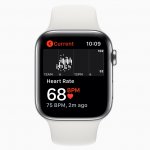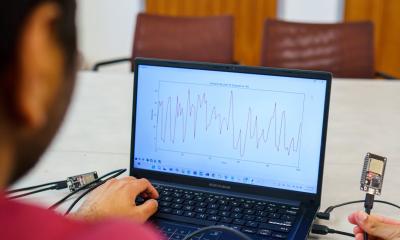News • Wearable technology
Smart watches and fitness trackers: useful, but may increase anxiety
How does measuring our sleep, exercise and heart rates using various apps and fitness watches affect us? Self-quantifying may better the understanding of our individual health, but it also gives rise to anxiety.

Image source: Unsplash/Simeon Jacobson
Is my heart beating slightly fast? Is a heart attack coming? I didn’t sleep as much as I thought I had last night – is that bad for my heart? Health apps and fitness watches can shed considerable light on how our bodies work and make recommendations for a healthy lifestyle. However, self-measuring can have a downside too, according to a new study published in the Journal of Medical Internet Research (JMIR) that examined the experiences of 27 heart patients who used 'Fitbit' fitness watches to measure their sleep, heart rates and physical activity.
Although the 28–74 year-old heart patients learned more about their illnesses and were motivated to exercise during the six months that they wore the watches, they also became more anxious, explains Tariq Osman Andersen, an assistant professor at the University of Copenhagen’s Department of Computer Science and one of the researchers behind the study: "Our study shows that, overall, self-measurements are more problematic than beneficial when it comes to the patient experience. Patients begin to use the information from their Fitbits just as they would use a doctor. However, they don't get help interpreting their watch data. This makes them unnecessarily anxious, or they may learn something that is far from reality," he says.
Along with two other researchers from the University of Copenhagen and the company Vital Beats, Andersen examined patients with cardiac arrhythmia and pacemakers through 66 qualitative interviews. They conclude that, overall, there are two points that include both the pros and cons of using Fitbit watches:
- More information calms, but also awakens doubt
Patients have a sense that they are becoming more in tune with their overall health, but they link the information to their heart disease, for which there is no safe basis. For example, if they see that they aren’t sleeping as much as they should be, they become uncomfortable and fear that this may exacerbate their illness. Similarly, they often link fast hearts rate with an increased risk of heart attack. "Conversely, the Fitbit watch can be calming, if data shows that you are sleeping well and have a low heart rate. The problem is that you cannot use data directly related to heart disease because the watch is designed for sports and wellness, as opposed to managing disease," explains Andersen.
- Patients gain the courage to exercise, while simultaneously experiencing feelings of guilt
Another aspect of the Fitbit watch with both positive and negative aspects, is exercise. On one hand, patients were motivated to be active, but at the same time, the app revealed when patients did not attain the recommended 10,000 daily steps, which made many of them feel guilty. "The Fitbit watch is not designed for heart patients, so they should not necessarily follow the same recommendations for exercise as those who are in good health," explains Andersen.
Recommended article

News • Mobile Health
Apple Watch: health studies to benefit from new smartwatch app
During its latest keynote presentation, tech giant Apple announced cooperations for health studies. The latest model of their smartwatches are to be key in their execution. Apple announced the three medical studies in partnership with leading US academic and research institutions.
The use of health apps like the Fitbit watch is part of a growing trend to measure the health of, among others, those with chronic illnesses. According to Tariq Osman Andersen, they offer great promise: "There is a tremendous potential in engaging patients outside the hospital by allowing them to manage their illnesses through health apps like the Fitbit watch," he explains. But for health apps to have an effect, patients need help interpreting data related to sleep, heart rate and exercise habits, according to the research team behind the study: "We believe it is time to think in terms of ‘collaborative care’, where both patient and clinicians benefit from the new health data and are thereby able to work together to manage and treat chronic diseases. This requires that we create a digital platform in which clinicians and patients can jointly interpret data from, for example, fitness watches, without creating unnecessary additional work for clinicians," concludes Andersen.
Source: University of Copenhagen
05.08.2020











